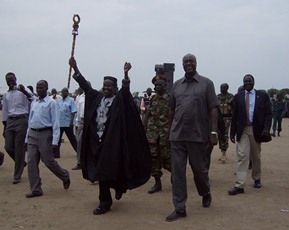South Sudan Speaker calls for peace in Jonglei state
June 28, 2012 (BOR) – The speaker of the South Sudan’s national assembly, Wani Igga, on Thursday called for Jonglei state communities to adhere to the peace deal signed between the state’s six major tribes last month.
Igga promised to travel throughout the state preaching the message of peace to the all the tribes.

In January the UN said that it was “extremely concerned that humanitarian facilities, including health centres, are being targeted during attacks,” which had displaced 120,000 people.
According to United Nations Mission in South Sudan (UNMISS) 888 people were killed between December 2011 and February 2012 in Jonglei in inter-ethnic conflict.
Igga urged the people to respect women and condemned both child and women abduction and cattle theft.
“If you have no children, marry a woman and produce children with her,” he advised.
In many South Sudanese communities the man is expected to give cattle to the family of the woman he wants to marry. With an influx of eligible bachelors after South Sudan’s secession and a poor agricultural season, the demand for cattle has increased and the market has reacted accordingly. This has led to an increase in the incidents of cattle raiding.
The lawlessness environment in the state which has seen an upsurge in inter-ethnic violence, has been compounded by a proliferation of small arms; an ugly reminder of more than two decades of civil war which ended with the signing of an agreement in 2005 which led the way for South Sudan’s secession in 2011.
Igga suggested that if a bride’s family are given a dowry which includes stolen cattle, “the lady may surely die of curses”.
With regards to the ongoing post-secession talks between Juba and Khartoum, Igga said that South Sudan must build an oil pipeline to Kenya.
One of the sticking points in negotations between the neighbouring nations has been the payment of transit fees and the use of Khartoum’s oil infrastructure; an disagreement which led South Sudan to halt oil production in January.
Igga also restated South Sudan’s right to protect its territories and that “there is nothing expensive than your own land – your land is yours”.
He is expected to hold a National Liberation Council and Sudan People’s Liberation Movement caucus meeting in the South Sudan Hotel soon.
(ST)
